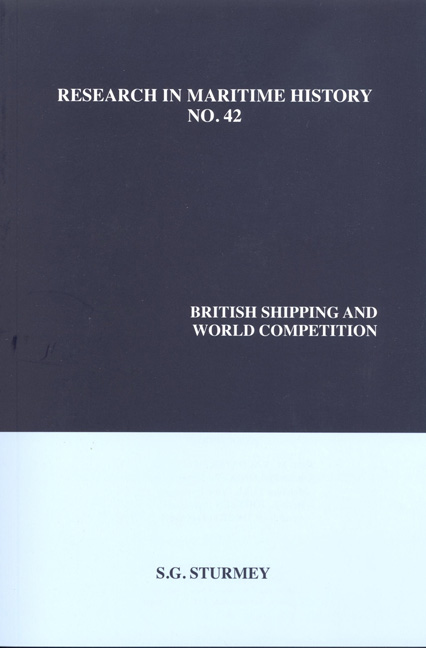Book contents
- Frontmatter
- Table of Contents
- Series Editor's Foreword
- About the Author
- Preface
- Figures and Tables
- Chapter 1 The Problem Defined
- Chapter 2 High Water: The Pre-1914 Period
- Chapter 3 War and Reconstruction
- Chapter 4 The Troubled Years: The Interwar Period
- Chapter 5 Nationalism in Shipping in the Interwar Years
- Chapter 6 The Birth of the Liberty
- Chapter 7 The Prosperous Age: The Postwar Period
- Chapter 8 Enemies of Competition in the Postwar Years
- Chapter 9 Flags of Convenience
- Chapter 10 Economics of Shipping Enterprises
- Chapter 11 Shipowning and Resource Allocation
- Chapter 12 Labour Relations and Labour Costs (by Basil Mogridge)
- Chapter 13 The Conference System
- Chapter 14 The Structure of the British Industry
- Chapter 15 The Question Answered
- Epilogue The Future
- Appendix The Contribution of British Shipping to the Balance of Payments
- Bibliography
- Index
Series Editor's Foreword
- Frontmatter
- Table of Contents
- Series Editor's Foreword
- About the Author
- Preface
- Figures and Tables
- Chapter 1 The Problem Defined
- Chapter 2 High Water: The Pre-1914 Period
- Chapter 3 War and Reconstruction
- Chapter 4 The Troubled Years: The Interwar Period
- Chapter 5 Nationalism in Shipping in the Interwar Years
- Chapter 6 The Birth of the Liberty
- Chapter 7 The Prosperous Age: The Postwar Period
- Chapter 8 Enemies of Competition in the Postwar Years
- Chapter 9 Flags of Convenience
- Chapter 10 Economics of Shipping Enterprises
- Chapter 11 Shipowning and Resource Allocation
- Chapter 12 Labour Relations and Labour Costs (by Basil Mogridge)
- Chapter 13 The Conference System
- Chapter 14 The Structure of the British Industry
- Chapter 15 The Question Answered
- Epilogue The Future
- Appendix The Contribution of British Shipping to the Balance of Payments
- Bibliography
- Index
Summary
Many maritime historians like to claim that our discipline is a “big tent. “ By this we mean that we welcome contributions not only from a wide range of historians but also from humanists and social scientists who share our interest in the historical relationship of humankind with the sea. It is in this spirit that we are pleased to offer you the latest addition to our reprint series, S.G. Sturmey's British Shipping and World Competition. Originally published in 1962 and long out of print, this is the work of an important maritime economist who, as readers unfamiliar with the book will surely note, had a strong historical bent.
When Dr. Sturmey wrote this book he explicitly denied that it was “a history” because he had no intention of recounting the “whole story” of the development of British shipping from the late nineteenth to the mid-twentieth century. Since few historians believe that anyone can ever tell the “whole story,“ this should not disqualify British Shipping and World Competition from consideration as an historical work. Indeed, the question he posed was by any measure an important historical query. “Why,” he wondered, “has the tonnage of ships registered in the United Kingdom declined from over forty-five percent of the world total in 1900 to about sixteen percent of that total in 1960?” In seeking to answer this question, Sturmey put forward four hypotheses which he proceeded to test. With some qualifications, he concluded that the primary reason for the decline had to do with decisions made within the industry - in other words, that the most important causes were endogenous. In making this claim, of course, he was flying in the face of contemporary opinion both within and without the shipping industry, and in the process British Shipping and World Competition became a provocative book.
Although it may have aroused vociferous debate, much of this book has stood the test of time as a work of history. Indeed, in many ways it was - and remains - a seminal work. For example, his arguments in chapters 4 and 5, which focus on the interwar years, have created a paradigm for thinking about that period which no subsequent historian has been able to ignore.
- Type
- Chapter
- Information
- British Shipping and World Competition , pp. ix - xPublisher: Liverpool University PressPrint publication year: 2009

